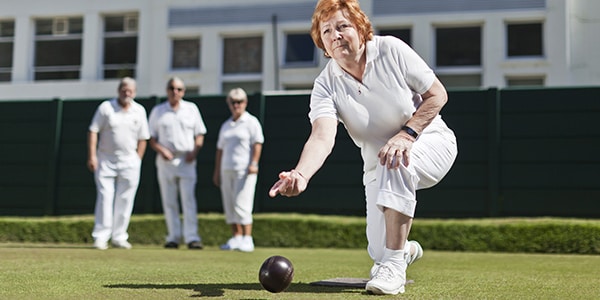Falls in the elderly: Can you prevent them?
Having a fall can be a lot more serious as you age but, thankfully, some are avoidable. Here’s your guide to fall prevention, including balance exercises for older adults.
As we get older, physical changes and health issues can increase the risk of falls. In fact, falls are a leading cause of injury among older people.
An estimated one in four people over 60, and one in three people over 65, have a fall each year.
“From the age of 80, the risk increases dramatically, with about 50% of people falling at least once a year,” says Associate Professor Kim Delbaere, director of the Falls, Balance and Injury Research Centre at Neuroscience Research Australia. “When you get older, falls are very common.”
Falls can cause physical pain, complications and dent your confidence. But the good news is some falls might be preventable and there are lots of simple, practical strategies that can help keep you on your feet.

What causes falls in the elderly?
Research has identified more than 400 risk factors associated with falling. Some of the most common reasons why older people have falls fit into two main categories: personal and environmental.
Personal risk factors:
- Reduced mobility – loss of balance and poor leg strength are more common as we get older.
- Medications – side effects of some medications, including feeling drowsy or dizzy, can affect orientation and stability. Sleeping tablets are a common culprit, and if you take lots of different medications, the effect is magnified. “Taking four or more different medications can increase your fall risk,” says Assoc Professor Delbaere.
- Cognitive impairment – Assoc Prof Delbaere says conditions like dementia that interfere with brain function increase your risk of falls. “Reduced executive function, which is the ability to make quick decisions and to do two things at once, will also drop and be less efficient as we as we get older, which can contribute to falls.” she says.
- How you’re feeling – conditions like depression and anxiety are associated with falls, says Assoc Prof Delbaere. And if you’ve fallen before, the fear of falling again can affect your confidence and stability.
Environmental risk factors:
- Inside the home – “Wet or uneven surfaces, stairs, poorly lit walkways and objects like cords, handbags and loose mats can all contribute to falls,” says Rachel Meade, injury prevention manager at Injury Matters.
- Outside the home – “Uneven pavements or footpaths, garden tools and hoses that are left out, and construction sites that people have to navigate can all result in a fall,” says Rachel.
The impact of falls on older people
Because older bodies are less resilient, the physical impact of falls can be severe. Among people aged over 65, falls are one of the leading reasons for hospital admission.
“The most common hospitalised injuries from falls are fractures to the hips and thighs, followed by injuries to the head,” says Rachel.
Assoc Prof Delbaere says about 5% of falls result in a fracture. The risk of fracture increases with age and it rises further with conditions like osteoporosis.
“The outcome of a fall is usually more serious for someone with osteoporosis because their bones are compromised,” says Rachel.
The psychological impact of falls can also affect your health – and increase the risk of future falls.
“Concern about falling is often more common than falling itself,” says Assoc Professor Delbaere. “That can have substantial consequences for people in that they might stop doing activities they enjoy, which can affect their mental health and result in a negative spiral where they become less active. As a result of that their balance may deteriorate and their muscle strength may decrease, which are risk factors for falling.”
Fall prevention strategies for the elderly
Assoc Professor Delbaere believes most falls are preventable. “It's still such a common belief among older people as well as their family members that falls are part of ageing. But even though ageing is a risk factor for falls, it doesn't mean that it's not preventable.”
And the benefits of fall prevention are many, including improved physical and mental health, greater independence and, ultimately, better quality of life.
So, what’s the best way to prevent falls? Exercise. It will improve your balance, strengthen your muscles and bones and improve your overall fitness.
“Exercise is the single most-effective strategy to prevent falls,” says Assoc Professor Delbaere. “But not just any exercise. Generally, it’s important to include a significant amount of standing balance exercises for two to three hours a week.”
Activities like standing on one leg, walking in a straight line while stepping over objects and walking heel to toe can help to build strength and balance. Simple exercises at home can also be effective, and an exercise physiologist can help with a targeted and effective routine. If organised sport is more your thing, try tai chi, aerobics, yoga, lawn bowls or anything that involves leaning forwards, backwards and to the side.
Family members and carers can help by removing or reducing environmental risk factors like repairing uneven surfaces, improving lighting and putting away hoses and garden tools.
“If, for example, there’s a set of stairs in the home with a wobbly railing, a family member could assist by getting it replaced,” says Assoc Professor Delbaere.
Keen to contribute to research that seeks to help to reduce falls among older people? Associate Professor Delbaere’s team is seeking volunteers aged over 65 to participate in its StandingTall-Plus research study.
Words by: Angela Tufvesson
First published October 2020.
Related Articles
Health checks by age
Your guide to staying on top of your health, through every stage of life.
Exercise for seniors
Find out the best ways to stay fit and well during your senior years.